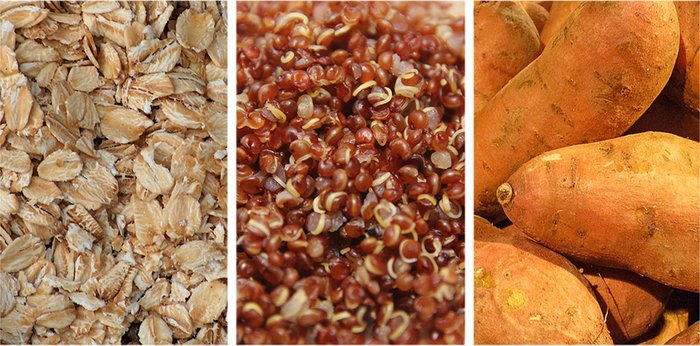You know that protein is essential for muscle growth, but carbohydrates also play an important role. Here's what you need to know.
Carbohydrates, Proteins and Insulin
Carbohydrates create anabolism largely by triggering a cascade of hormone-driven events. (To be clear, you also get an insulin response from proteins.) Chief among these events is the secretion of a hormone called insulin from the pancreas. Many people realize that insulin regulates blood glucose levels, but insulin is not a simple trick.

Carbohydrates and the resulting insulin response have a lot to do with muscle growth.
Carbohydrates and the resulting insulin response have a lot to do with muscle growth.
It is so multifunctional that many experts believe it is absolutely integral for muscle synthesis, among other things. For example, one of the many functions of insulin is to boost the absorption of amino acids; In other words, it takes amino acids out of the bloodstream and into the muscles.
Therefore, carbohydrates and the resulting insulin response obviously have a lot to do with muscle growth.
Synthesis of carbohydrates and proteins
When looking specifically at protein synthesis, carbohydrates are not required. Leucine, found in egg yolks, for example, is an essential amino acid and is the main driver of protein synthesis. This means that protein synthesis can occur in the absence of carbohydrates.
So back to the pressing questions: is insulin anabolic? Does it help build muscle?
First of all, the anabolism to It is often incorrectly used as a synonym for muscle protein synthesis . I encourage you to take a broader view of anabolism beyond just combining amino acids to build muscle tissue.
Anabolism encompasses the entire physiological process that supports muscle development! In that sense, yes, insulin is definitely anabolic.
Carbohydrates, Insulin and Recovery
Recovery from muscle breakdown is an often overlooked cog in this muscle building machine. After all, the better you can recover from workouts, the more frequently you can train. Training frequency is a key factor for hypertrophy. Carbohydrates improve recovery and therefore your ability to build muscle.
While carbohydrate-mediated insulin stimulation does not lead to protein synthesis per se, it does reduce muscle breakdown. In essence, the anti-catabolic nature of carbohydrates in turn makes them anabolic. Whaaaat? Remember, you are working to divorce your association of anabolism from protein synthesis.
In this sense, carbohydrates in fact is anabolic; It contributes to the entire muscle development process. The addition of insulin exerts beneficial effects on the dance between protein synthesis and breakdown, called nitrogen balance.
Carbohydrates also improve recovery speed. During intense exercise, the strength of your immune system is temporarily compromised, but carbohydrates reduce the impact of this immunosuppressive effect and help restore depleted glycogen stores. Whether you should shove a sweet potato down your throat immediately after your workout depends on the type of workout you're doing, your workout frequency, and your overall goals.
If you train only three days a week, it is not a priority to store carbohydrates in your muscles immediately after a workout; Your regular consumption of carbohydrates throughout the day will help with glycogen replenishment. If you're trying to gain a ton of muscle mass, it probably can't hurt to inhale a couple of bananas post-workout, regardless of nutrient timing.
Creatine Transport
In my opinion, the Creatine is a must-have supplement. Whether it's because of its well-known ability to increase strength or its lesser-known ability to potentially improve cognitive function and insulin sensitivity, I highly recommend using it every day.
Creatine ingestion with carbohydrates is known to increase intramuscular creatine levels due to the effects of insulin on creatine transport and improve muscle creatine storage capacity.
In addition, insulin can enhance the accumulation of electrolytes in cells, which, like overfilling muscle creatine stores, increases cell volume. Increased cellular hydration and volume facilitate the onset of anabolism.
Anabolism Without Carbohydrates?
After everything I've discussed here, it's clear that carbohydrates are anabolic. Time to get back to my original deadlift conquest. Was it possible to build strength and muscle while I follow a ketogenic diet ? Despite Dowdell's sigh, I found the answer is a resounding yes.
Don't get me wrong, being keto while training hard was no piece of cake. In three and a half months, I packed on 80 pounds on my deadlift and hit a new PR of 500 pounds on my first attempt.
It turns out that while carbohydrates are anabolic, I can still achieve an anabolic feat in the almost complete absence of carbohydrates. The human body is an amazing machine, possessing the ability to make intelligent adaptations to a variety of situations.
Carbohydrates are not required to turn on the protein synthesis switch, but perhaps there are other ways to make the overall anabolic process more efficient and effective.IMAGE
Carbohydrates are not required to flip the protein synthesis switch, but perhaps there are other ways to make the overall anabolic process more efficient and effective.
In a chronically low-carb environment, the body does not follow normal biochemical rules because has to change . It becomes much more efficient with muscle glycogen, upregulates the genetic expression of certain enzymatic machinery necessary for peak performance, and adapts as needed to excel in the presence of far fewer carbohydrates and far less insulin.
In a nutshell, my adventure into carb-free anabolism was to prove that can perform at a high level on minimal carbohydrates, at least in the short term. Carbohydrates are not required to flip the protein synthesis switch, but perhaps there are other ways to make the overall anabolic process more efficient and effective.
Does that mean everyone should adopt a ketogenic diet? I don't think it's for everyone (and maybe not for the long term), but it's interesting to see what your body can accomplish in good times and bad.
What do you think about achieving feats of strength while on a ketogenic diet? I'd love to hear from you, please share your comments below!
References
- Norton, L.E., et al., Leucine content of a complete meal drives maximal activation, but not duration, of skeletal muscle protein synthesis and mammalian target of rapamycin signaling in rats. The Journal of Nutrition, 2009. 139 (6): p. 1103-1109.
- Millward, DJ, knowledge gained from studies on leucine consumption in animals and humans. The Journal of Nutrition, 2012. 142 (12): p. 2212S-2219S.
- Paddon-Jones, D., et al., Exogenous amino acids stimulate human muscle anabolism without interfering with the response to mixed meal ingestion. American Journal of Physiology - Endocrinology and Metabolism, 2005. 288 (4): p. E761-E767.
- Chow, LS, et al., Mechanism of the anabolic effect of insulin on muscle: measurements of muscle protein synthesis and degradation using aminoacyl-tRNA and other surrogate measures. American Journal of Physiology - Endocrinology and Metabolism, 2006. 291 (4): p. E729-E736.
- WALSH, CH, et al., Whole-body potassium and nitrogen studies in newly diagnosed diabetics. QJM, 1976. 45 (2): p. 295-301.
- Valarini, R., et al., Anabolic effects of insulin and amino acids in promoting nitrogen accumulation in postoperative patients. Journal of Parenteral and Enteral Nutrition, 1994. 18 (3): p. 214-218.
- Gleeson, M. and NC Bishop, Modification of immune responses to exercise by carbohydrate, glutamine, and antioxidant supplementation. Immunol Cell Biol, 2000. 78 (5): p. 554-561.
- Jentjens, R. and A. Jeukendrup, Determinants of post-exercise glycogen synthesis during short-term recovery. Sports Med, 2003. 33 (2): p. 117-44.
- Rawson, E.S. and J.S. Volek, Effects of creatine supplementation and resistance training on muscle strength and weightlifting performance. J Strength Cond Res, 2003. 17 (4): p. 822-31.
- Benton, D. and R. Donohoe, The influence of creatine supplementation on cognitive functioning in vegetarians and omnivores. Br J Nutr, 2011. 105 (7): p. 1100-5.
- Eijnde, BOt, et al., Effect of oral creatine supplementation on human muscle GLUT4 protein content after immobilization. Diabetes, 2001. 50 (1): p. 18-23.
- Steenge, GR, et al., Stimulating effect of insulin on creatine accumulation in human skeletal muscle. American Journal of Physiology - Endocrinology and Metabolism, 1998. 275 (6): p. E974-E979.
- Green, AL, et al., Carbohydrate ingestion increases creatine accumulation in skeletal muscle during creatine supplementation in humans. American Journal of Physiology - Endocrinology and Metabolism, 1996. 271 (5): p. E821-E826.
- Schliess, F., Call volume and insulin signaling. International review of cytology, 2003 . 225: p. 187-228.
- Schoenfeld, BJ, The mechanisms of muscle hypertrophy and their application to resistance training. J Strength Cond Res, 2010. 24 (10): p. 2857-72.


